Review: In the New Musical Black No More, a Machine Makes Black People White
Brandon Victor Dixon leads a starry cast in this adaptation of George S. Schuyler’s Afrofuturist novel.
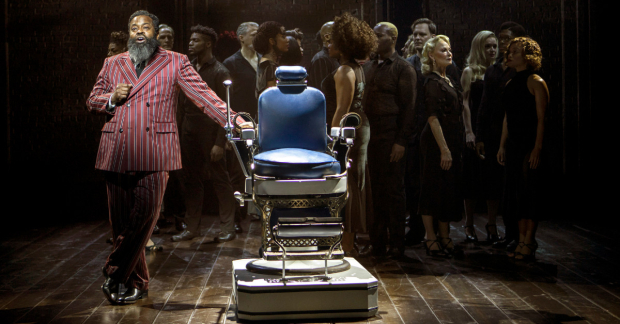
(© Monique Carboni)
In the 1931 satirical novel Black No More, which tells the story of a scientist who creates a machine that can make Black people white, author George S. Schuyler takes aim at everyone for America's persistent racial problems. Blacks and whites, according to his scathing and absurdly comical critique, are all active participants in perpetuating the power structures that for centuries have kept whites at the top of America's social and economic orders and people of color somewhere beneath. With caustic humor, he gives us his take on America's race problem, but he doesn't offer a concrete solution.
If Schuyler's machine startles, offends, or infuriates you, it's meant to. John Ridley, who won an Oscar for his adaptation of Solomon Northrup's 12 Years a Slave, follows Schuyler's lead and doesn't spare us the vicious language of bigotry and hate in his book for the new musical Black No More, which the New Group's Scott Elliott directs at the Pershing Square Signature Center. Nor does Tariq Trotter (Black Thought to fans of the Roots), who signed on to write the show's lyrics and co-write the music with Anthony Tidd, James Poyser, and musical supervisor Daryl Waters. The score offers an ever-evolving procession of genres that blurs the lines between past and present, swirling from early jazz and big band, to rap, R&B, and even a little hoedown-style country-western (excellent sound design by Nevin Steinberg). Though the musical takes place in the 1930s, it often sounds like today, and that's no accident.
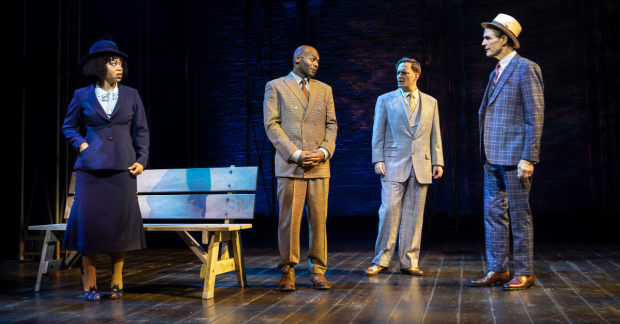
(© Monique Carboni)
We know we're in for provocative theater as soon as Trotter, who plays the scientist Dr. Crookman, wheels out the insidious machine, a symbolically significant barber chair, at the beginning of the show. Nattily dressed in a striped suit that suggests a con man ('30s-inspired costumes by Qween Jean) and surrounded by a swirling ensemble of dancers, we are in Harlem in the 1930s, suggested by a large, fast-stepping ensemble performing Bill T. Jones's period-inspired choreography. But like the music, Derek McLane's minimalist set suggests that this could be today's Harlem, a place, raps Crookman, that is "a beacon of art and intellectualism. Yet dualism is where the problem lies."
Brandon Victor Dixon brings his incomparable vocals and comic timing to the role of Max Disher, a Black man who falls for a white woman named Helen (Jennifer Damiano) and would do just about anything to get her, even though she has no qualms about referring to him with a racial slur after their first meeting. So when he hears about Dr. Crookman's invention, he's first in line, and with his new white skin, he's off to Georgia to find her despite the protestations of his friend Buni (Tamika Lawrence) and the revolutionary writer Agamemnon (Ephraim Sykes).
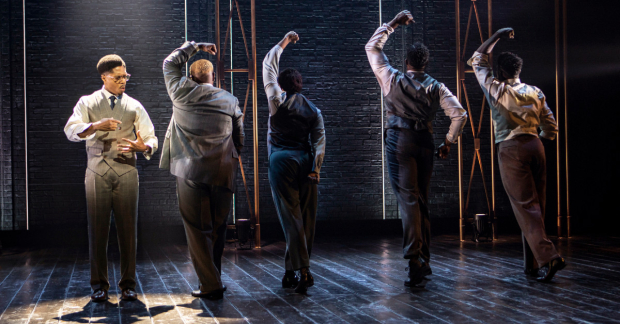
(© Monique Carboni)
Once there, he finds he can get ahead by joining a white supremacist organization called the Knights of Nordica (Jeff Croiter's lighting gives the group's meetings an infernal look). The leader is Reverend Givens (Howard McGillin), who's up in arms about this Black No More business. If all Black people turn white, the Knights will have to find some other group to hate, like immigrants, Jews, or maybe those homosexuals. Without someone to look down on, so Givens's logic goes, the uneducated whites will ask for pay raises and benefits, start unions, and become otherwise ungovernable. And while the Knights are at it, they might as well wage war on science too, because what has science ever done besides make folks aware of things? Hate, fear, and ignorance keep people in line.
Turns out that the reverend is Helen's father, and self-serving Max is happy to sell out Black people and anyone else if it'll get him the woman he wants. Duped by Max's new appearance, Givens allows him to marry Helen, but big trouble is on the horizon when Helen gets pregnant, and Max realizes that their sure-to-be-darker-skinned child will expose his Black identity.
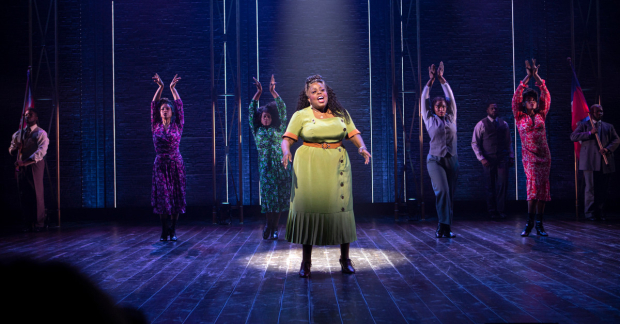
(© Monique Carboni)
The first act keeps us on edge with its dramatic twists, eyebrow-raising language, and terrific performances. Theo Stockman plays Helen's virulently racist brother, Ashby, with infuriating believability and raps like a pro in "You Get What You Pay For." Tracy Shayne plays the stately pillar of Southern bigotry Mrs. Givens with despicable elegance. Lillias White, however, stands out for her performance as Madame Sisseretta, the owner of a hair-straightening salon whose business is folding, now that her clients are opting for Crookman's permanently straight hair. In one arresting scene that recalls the barber chair, Madame Sisseretta admits to profiting from Black women's desire for straight locks ("You all brought me your insecurities, and I just took 'em to the bank"). But White's performance stands out everywhere: From an early dance number at the Savoy nightclub in which White (wearing a memorable wig designed by Nikiya Mathis) scats with breathtaking intensity, to the second act powerhouse song "What's a Sister to Do?," she has our eyes and ears at her command.
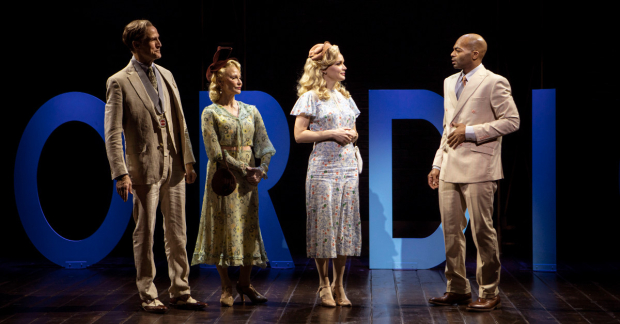
(© Monique Carboni)
Despite the brilliant cast and the show's thematic daring, there is a palpable falloff in action during the second act as Ridley's book loses its satirical edge and humor, and slides into the melodramatic and preachy. Several of the ballads, as well as Buni and Helen's duet "Cut to the Chase," take the air out of the balloon, which goes flat when Max breaks the fourth wall late in Act 2. Rather than letting the audience do some work, Ridley has Max offer us some unsatisfying advice about what we should do to get past our racial differences.
Sadly, people will never simply stop hating each other. We can try to help our children do better than we've done, as Lawrence stirringly sings in "Victory for Love," but getting adults to treat each other and themselves with love is a far tougher task than Max's advice suggests. It's enough if Black No More gets us thinking about ourselves and talking about what we might need to do to dismantle hate; it doesn't have to offer the solution.









